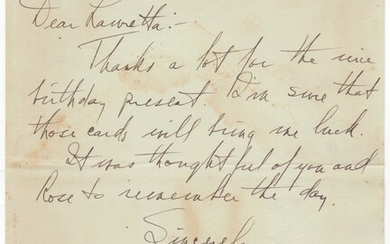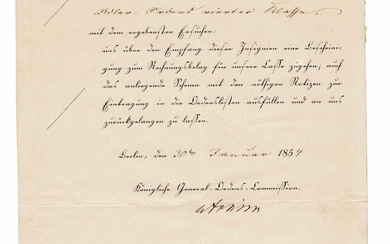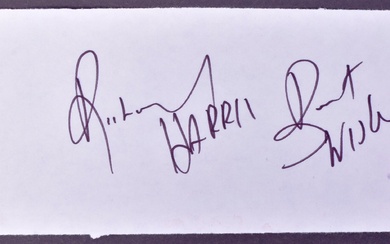Autograph Letter, Signed, to Harry [Friedenwald] (May 14, [1933]) about the plight of Jews in Nazi Germany.
By CUSHING, Harvey
Letterhead: Dr. Harvey Cushing/ The Peter Bent Brigham Hospital/ Boston. "Dear Harry / I am as deeply distressed as you over the unbelievable happenings in Germany. I have had many letters from my Jewish friends and patients in Germany. I have written them all to say that so far as I could see there was only one thing for them to do to tighten their belts and to wait until this storm blows over as it surely will. I am sure that the President knows more about it already than either you or I do and he has probably received thousands of letters of expostulation. Unfortunately I am barred by my chance connection with his family from writing such a letter as you suggest. You can see that it would be improper for me to do so. He is a humane person well informed about what is going on and we can depend upon him to act when and how he sees fit. Were he to make such a protest at this moment to the Hitler government it might completely disarrange[?] a program he already has[?] on foot[?], which would be to the benefit of those to whom we would wish to bring success. With sympathy and affection. Sincerely yours Harvey Cushing May 14." The letter is dated only May 14, but the year must be 1933. The Brigham letterhead means it was written before Cushing left for Yale in October 1933, and it must be after Hitler came to power. So the only May it could be is May 1933. Michael Bliss, in his biography Harvey Cushing, a Life in Surgery, discusses Harvey Cushing's views on the plight of Jews in Nazi Germany (on pp. 505-07 and footnotes 41 and 42 on p. 567). He quotes from three letters Cushing wrote during the same period as this letter to Harry Friedenwald--Cushing to Klebs, April l, 1933; Cushing to Boas April 27, 1933; Cushing to C. F. List, March 30, 1933, in each of which Cushing expresses the same sentiment that this matter will blow over. But, as Bliss notes, Cushing soon realized he was wrong and became involved in the Emergency Committee in Aid for Foreign Displaced Physicians (there is a whole file of correspondence at Yale in the Cushing archive concerning this Committee). Cushing's reference in the letter to "my chance connection with his family" is to his daughter Betsey's marriage in 1930 to James Roosevelt, son of President Franklin D. Roosevelt, so Cushing was James's father-in-law and FDR was Betsey's father-in-law. However, on other matters, Cushing had no problem going to FDR to try to get something done, as this article, "No Ordinary Time, No Ordinary Men: the Relationship between Harvey Cushing and Franklin D. Roosevelt, 1928 1939", shows.
Publication year: 1933
Vendor: Scientia Books, ABAA ILAB
Buy Now on
By CUSHING, Harvey
Letterhead: Dr. Harvey Cushing/ The Peter Bent Brigham Hospital/ Boston. "Dear Harry / I am as deeply distressed as you over the unbelievable happenings in Germany. I have had many letters from my Jewish friends and patients in Germany. I have written them all to say that so far as I could see there was only one thing for them to do to tighten their belts and to wait until this storm blows over as it surely will. I am sure that the President knows more about it already than either you or I do and he has probably received thousands of letters of expostulation. Unfortunately I am barred by my chance connection with his family from writing such a letter as you suggest. You can see that it would be improper for me to do so. He is a humane person well informed about what is going on and we can depend upon him to act when and how he sees fit. Were he to make such a protest at this moment to the Hitler government it might completely disarrange[?] a program he already has[?] on foot[?], which would be to the benefit of those to whom we would wish to bring success. With sympathy and affection. Sincerely yours Harvey Cushing May 14." The letter is dated only May 14, but the year must be 1933. The Brigham letterhead means it was written before Cushing left for Yale in October 1933, and it must be after Hitler came to power. So the only May it could be is May 1933. Michael Bliss, in his biography Harvey Cushing, a Life in Surgery, discusses Harvey Cushing's views on the plight of Jews in Nazi Germany (on pp. 505-07 and footnotes 41 and 42 on p. 567). He quotes from three letters Cushing wrote during the same period as this letter to Harry Friedenwald--Cushing to Klebs, April l, 1933; Cushing to Boas April 27, 1933; Cushing to C. F. List, March 30, 1933, in each of which Cushing expresses the same sentiment that this matter will blow over. But, as Bliss notes, Cushing soon realized he was wrong and became involved in the Emergency Committee in Aid for Foreign Displaced Physicians (there is a whole file of correspondence at Yale in the Cushing archive concerning this Committee). Cushing's reference in the letter to "my chance connection with his family" is to his daughter Betsey's marriage in 1930 to James Roosevelt, son of President Franklin D. Roosevelt, so Cushing was James's father-in-law and FDR was Betsey's father-in-law. However, on other matters, Cushing had no problem going to FDR to try to get something done, as this article, "No Ordinary Time, No Ordinary Men: the Relationship between Harvey Cushing and Franklin D. Roosevelt, 1928 1939", shows.
Publication year: 1933
Vendor: Scientia Books, ABAA ILAB
![Autograph Letter, Signed, to Harry [Friedenwald] (May 14, [1933]) about the plight of Jews in Nazi Germany. Autograph Letter, Signed, to Harry [Friedenwald] (May 14, [1933]) about the plight of Jews in Nazi Germany.](https://gcp-la8-storage-cdn.lot-art.com/public/upl/34/Autograph-Letter-Signed-to-Harry-Friedenwald-May-14-1933-about-the-plight-of-Jews-in-Nazi-Germany_1599751842_2063.jpg)



![[LINCOLN] Family Friend's Mournful Assassination Reaction [LINCOLN] Family Friend's Mournful Assassination Reaction](https://gcp-la8-storage-cdn.lot-art.com/public/upl/49/LINCOLN-Family-Friends-Mournful-Assassination-Reaction_661be68d77dc4-thumb-46365100_1713104526-661be68e71333.jpg)


